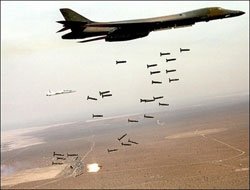Israel has cut purchases of U.S.-made cluster bombs, defense officials said on Tuesday, stocking up on supplies from a state-owned Israeli company rather than heeding calls for an outright ban.
More than 100 countries have banned the bombs because they can kill indiscriminately.
Cluster bombs have a relatively high failure rate compared to more conventional explosive munitions, but are used by armies as a way of hitting enemy combatants in areas where no precise targets can be located.
The Israeli air force and artillery showered south Lebanon with cluster shells, each containing dozens or hundreds of grenade-size bomblets, during the 34-day war against Hezbollah two years ago.
Between 30 percent and 40 percent of the bombs failed to explode on impact, according to the United Nations Mine Action Coordination Centre (UNMACC). Many of these were later detonated by accident, killing 20 civilians and wounding 195, it said.
Israeli defense officials disputed the UNMACC's findings, putting the "dud rate" at less than 15 percent.
While no army wants to fire dud bombs in conflict, failed devices that later maim and kill civilians have created diplomatic pressures that Israel wants to limit.
The officials said Israel has since begun switching to the M85 cluster bomb made by Israel Military Industries' (IMI), which says it's the weapon that includes a self-destruct fuse designed to blow up unexploded ordnance.
IMI claims a less than 1 percent dud-rate. A 2007 report on the M85 by Norwegian People's Aid, one of several groups campaigning for a ban on cluster munitions, rated it at more like 10 percent.
Critics say cluster bomb reliability can be impaired by tough terrain or by bomb container shells that fail to open properly -- factors not always simulated in laboratory tests.
The United States, along with Israel and other major military powers such as China and Russia, has declined to join a global drive to ban the cluster bomb.
The Pentagon said in July that it would require "better safety standards" in U.S.-made cluster munitions.
PHOTO CAPTION
Cluster bombs
Source: Reuters


 Home
Home Discover Islam
Discover Islam Quran Recitations
Quran Recitations Lectures
Lectures
 Fatwa
Fatwa Articles
Articles Fiqh
Fiqh E-Books
E-Books Boys & Girls
Boys & Girls  Hajj Rulings
Hajj Rulings Hajj Fatwas
Hajj Fatwas














